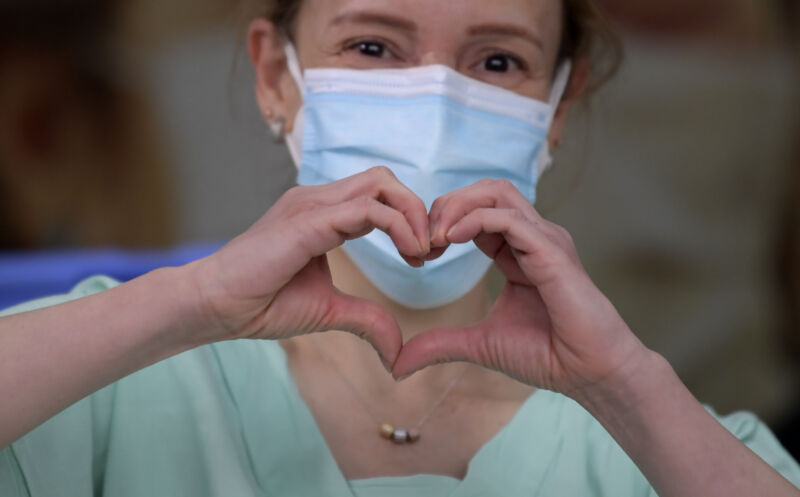As long as there have been vaccines against COVID-19, there have been arguments for why people shouldn't get those vaccines. One of the more persistent—and hairier—arguments is that people who have already been infected with the pandemic coronavirus, SARS-CoV-2, don't need a vaccine. An infection will generate immune responses similar to those generated by vaccines, the thinking goes. So, why waste coveted vaccine doses on people who already have immune responses against the virus—which may also needlessly put those people at risk of vaccine side effects, however rare?
It's a reasonable question, and there is legitimate scientific debate about it. There are also different approaches to the issue in terms of public health policy. In Israel, for example, people who have recovered from COVID-19 after testing positive on a PCR test can get a vaccination "Green Pass" that's valid for up to six months. The pass allows them entry into various places just as it does for people who are fully vaccinated. In the European Union, some member states offer a similar "Digital COVID Certificate" to people who have recovered from COVID-19 and received just one dose of a two-dose mRNA vaccine regimen.
In the US, however, public health officials are unequivocal in their approach: people are categorized as either vaccinated or unvaccinated, regardless of prior infection. It's an approach with many strengths, including robust scientific data supporting vaccination for people who have recovered. That data—which we'll get into below—has consistently shown that immune responses from natural infections are extremely variable, thus unreliable. Vaccines, on the other hand, have repeatedly been proven to generate highly protective immune responses.
The vaccines are also remarkably safe, with few serious side effects that occur extremely rarely. One of the most concerning side effects is myocarditis (inflammation of the heart muscle). But even there, the rate of myocarditis in the most at-risk group (males ages 12 to 29) is only estimated to be 41 in a million, and the cases are generally mild.
Comparing that with actual COVID-19 infections—which can cause severe disease even in young, healthy people and may cause persistent, months-long symptoms in up to half of people infected—there's no contest. Vaccines are safer. And they're just as safe for people who have previously recovered. People with past COVID-19 cases are no more likely to have serious side effects from vaccines than people who haven't been previously infected, though they may have more side effects.
The US approach also has logistical benefits. Simple categories of "vaccinated" and "unvaccinated" skip over the messy and difficult step of figuring out who has been infected and when. From the early stages of the pandemic, the US has struggled—and is still struggling—to roll out accurate, widely available tests for SARS-CoV-2. Many people who have been infected never officially tested positive. Others assumed they were infected when they may have actually had one of many other respiratory infections. And antibody tests that look for evidence of past infections are notoriously inaccurate.
Though opponents argue that mass vaccination is driven by "evil corporations" out for prodigious profits at all costs, the fact is that vaccines are extremely safe and offer recovered people strong, lasting protection against a virus that has already killed more than 700,000 Americans.
Efficacy and variability
That's not to say that there aren't weaknesses to the US's approach. For one thing, the approach can make vaccines look bad. In many instances, vaccine effectiveness is gauged by comparing COVID-19 case rates between vaccinated and unvaccinated people. But in the US, the unvaccinated include people who have no immunity and recovered people, who have some immunity and are, thus, expected to have fewer infections. This waters down case rates in the unvaccinated group and ends up lowering the vaccine efficacy estimates.
Still, the vaccines' efficacy estimates are extraordinarily good. A recent study found that the Pfizer-BioNTech mRNA vaccine was holding steady with 90 percent efficacy against COVID-19 hospitalization for at least six months. A separate study found that the Moderna mRNA vaccine was 93 percent effective against hospitalizations among people without immunocompromising conditions. Johnson & Johnson's vaccine was 71 percent effective.
And again, many vaccine efficacy numbers don't account for past infection and may be artificially lower because of that. How much lower? It's unclear. Since the beginning of the pandemic, researchers have noted time and again that immune responses generated by SARS-CoV-2 infections vary wildly, with some of the weaker responses seen in people with mild disease and stronger responses in people with severe disease.
In one study Ars reported on back in June of last year, researchers looking at SARS-CoV-2 antibodies in people who had recovered found that the difference between the highest and lowest levels varied by a factor of over 1,000. The researchers saw even more variability when they looked at neutralizing antibodies—those known to bind to the virus and prevent it from infecting cells. Neutralizing antibody levels in recovered people varied over a range of 40,000-fold, and up to 20 percent of people didn't have any detectable level of neutralizing antibody.



3175x175(CURRENT).thumb.jpg.b05acc060982b36f5891ba728e6d953c.jpg)


Recommended Comments
Join the conversation
You can post now and register later. If you have an account, sign in now to post with your account.
Note: Your post will require moderator approval before it will be visible.